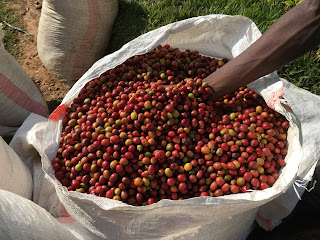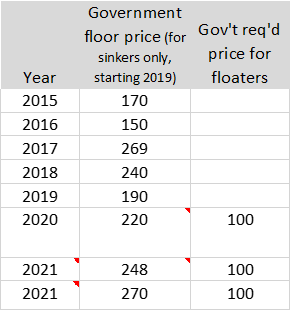June 2020 - 300 Club Introduction
“Price is the Best
Fertilizer”
~ Fair Trade Cocoa Advocate
Since 2019, Artisan has been developing an idea formed with input from roasters adament about paying a farmgate price that can be defended with data as covering cost of production and a margin.
Objectives of the Program:
·
Promoting and motivating farmers who invest in
coffee with time and money. Coffee quality starts from the plantation in which
good agricultural practices are applied.
·
Decrease incidents of potato taste defect (PTD).
This will be achieved through best practices like careful pruning and application
of pesticide. (See Gerard
and Bigirimana, 2018).
·
Increase productivity of trees owned by cooperative
members (farmers). Among other benefits, this will lower costs for the farmer per
kg cherry harvested.
·
Increase average quality (cup score) of
exportable green coffee from the cooperative. Among other benefits, this will
increase revenues for the cooperative and its members.
· Increase cherry density, which increases the ratio/rate of yield of exportable (screen 15+) green to cherries. Among other benefits, this decreases costs for the cooperative.
Effective Communication of Quality
Standards via Three-tier Pricing
The 300 Club was designed in collaboration with Kopakama and a roaster-buyer in early 2020. It aims to give the farmer confidence that they will receive a “specialty grade” farmgate price at least 3 years in a row, IF their coffee cherry meets a quality standard set by the cooperative. In 2015, 300 Rwf/kg cherry was disclosed by NAEB to be the price farmers of high quality cherry require. Historically, NAEB sets a farmgate price that is lower than the 300 RWF/kg cherry, (see Table 1). NAEB actively enforces two prices as the only prices allowed to be paid for the first payment to the farmer – a “floater” (bad cherry) price and a “sinker” (good cherry) price.
Table 1 – Cherry Price Tracking (Rwf/kg cherry)
The 300 Club introduces a third price for premium cherry, defined by quality standards.
· 300 Rwf – delivered in a certain time window; strict hand-sorting requirement; floaters removed
· 220-270 Rwf – (whatever is NAEB’s farmgate price) hand-sorting; floaters removed
· 100 Rwf – NAEB required price for floaters and waste
300 Club Premium to
the Cooperative
The price
Artisan pays to the cooperative for 300 Club coffee is paid in two parts.
·
Part 1: Artisan contracts a regular fixed contract price for microlot
coffee in year 1 of the program. In 2021, $5.62/kg ($2.55/lb green) FOB was a
typical microlot price for 86+ coffee.
·
Part 2: The second part is a premium paid at the
beginning of year 2 and is conditional on the cooperative agreeing to pay the
300 Rwf/kg cherry price in that following year and in the first price to the
farmer. In this way, the premium is paid at the time that reduces the debt the
cooperative incurs to buy cherry for the season. The bonus paid to Kopakama in
February 2020 was $1.00/kg green ($.45/lb) for the 300 Club coffee sold
in 2019 (which was 660 kg).
This program
is designed to build farmer confidence and investment over three years. A stable price of 300 Rwf/kg for three years
is expected to offer measurable impact on the objectives listed in section 1.
Artisan believes roaster/ buyers will be excited by the consistency and
excellent flavor of the 300 Club coffees, and request 300 Club coffee from
Rwanda.


No comments:
Post a Comment